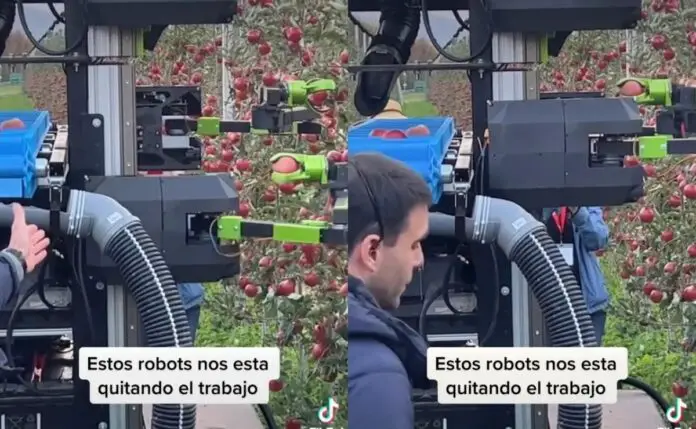Amid the increasing deportation of migrants in the United States, videos have gone viral on social media highlighting the impact of these policies, including the implementation of robots in sectors traditionally occupied by Latino workers.
One widely discussed video shows a machine picking apples in an orchard, with the phrase “These robots are taking our jobs” superimposed on the screen. The machine, capable of operating day and night, detects ripe fruits and collects them automatically.
However, technology still faces challenges. The video notes that the machine works at a slow pace and struggles on uneven terrain, limiting its efficiency in certain growing areas.
The reaction on social media was swift. While some users joked about the robot’s speed— “Legend has it that it hasn’t finished harvesting the fruit yet”—others pointed out that maintaining these machines could create new jobs: “Let me know when they hire someone to maintain the machine.”
These technological innovations reflect a shift in American agriculture as migrant labor faces increasing restrictions on working in the country.
Potential AI Job Transformations
The arrival of Artificial Intelligence (AI) has the potential to transform a wide range of jobs, particularly those involving repetitive and easily automatable tasks, such as data entry, document processing, or basic customer service. Jobs like cashiers, teleoperators, and transcriptionists could be significantly affected.
New Opportunities with AI
However, AI can also generate new job opportunities. Professionals will be needed to design, develop, implement, and maintain AI systems, as well as manage the changes they bring to organizations. New jobs will emerge in areas such as data science, AI engineering, and AI ethics.
AI Complementing Human Work
Furthermore, AI can complement human work rather than entirely replace it. In sectors such as medicine or law, AI can assist professionals in analyzing information and making decisions, allowing them to focus on more complex and creative tasks.
Source: Debate




